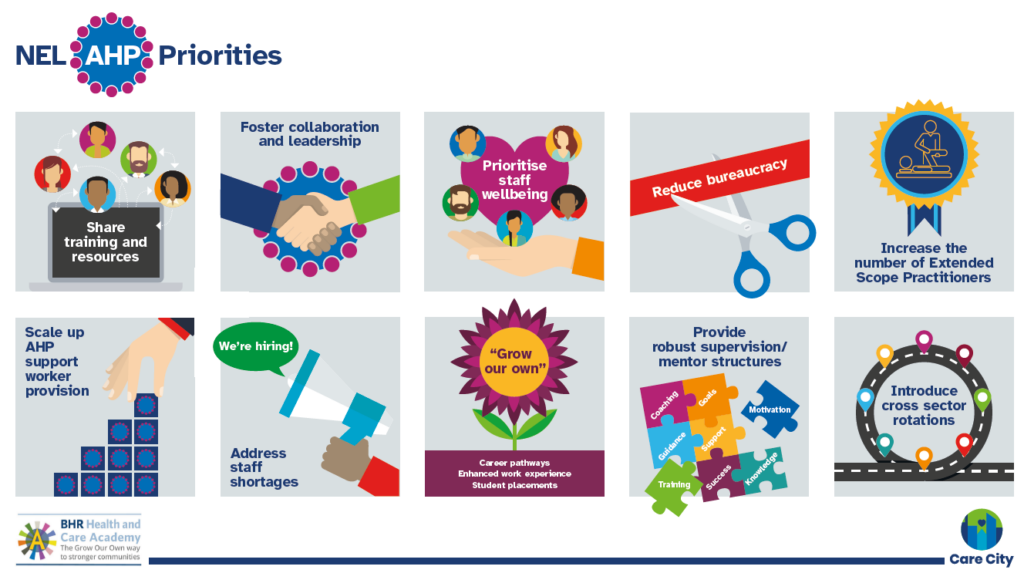Understanding the AHP landscape in Barking, Havering & Redbridge

Supporting the delivery of BHR Academy’s short and medium term AHP priorities.
The BHR Academy dashboard brings together workforce data from across health (acute, community, mental health and primary care) and social care organisations across the London Boroughs of Barking & Dagenham, Havering and Redbridge (BHR). This data has highlighted key themes within the Allied Health Professional (AHP) workforce including an increase in full-time equivalent (FTE) AHPs and an increasing vacancy rate. In October 2022, the BHR Academy AHP Task & Finish group reviewed the data and brought their insights and sense making to the quantitative data to develop a series of AHP priorities for the BHR Academy to take forward.
One of these priorities was to gain a more ‘on the ground’ perspective of the challenges identified through the Dashboard data, what is happening locally to address these and ideas for future approaches.
We were engaged to conduct a series of interviews with AHP service leads to capture these perspectives, provide qualitative insight to the data and support future workforce developments.
Our report details the themes arising from these interviews and provides recommendations for next steps.
Headlines
Prioritise staff wellbeing: Staff well-being must continue to be a priority, considering the pressures and challenges they face. Promoting accessible health and well-being programs, creating a culture where well-being is valued and integrated into the working day, and providing support for staff experiencing burnout or high caseloads can contribute to a more sustainable and supportive work environment. Read our deep dive report.
Reduce bureaucracy: Streamlining HR processes, reducing red tape, and simplifying paperwork are required to make the system more efficient and reduce pressure. This includes standardised pathways, reducing variation in care, and implementing electronic systems to eliminate excessive form-filling and improve access to information.
“We must strive for streamlined processes and embrace technology to eliminate the need for excessive form filling.”
Service Lead Interviewee
Foster Collaboration and Leadership: Strong leadership and collaboration among different professional groups are essential for effective service design and decision-making. Fostering a culture of collaboration, reducing competition, and ensuring the voices of AHPs are heard in service planning and at leadership level are vital for a more effective and satisfying work environment.
Increase the number of Extended Scope Practitioners (ESPs): To achieve equity with other boroughs in North East London, and support recruitment and retention, there needs to be an increase in numbers of Extended Scope Practitioners (ESPs) within BHR.
Share training and resources: large NHS organisations have far more learning and skill development opportunities than other organisations where they have a much smaller percentage of AHPs, and AHP support workers, in their workforce. To reflect the integrated nature of the health and care system we recommend that AHP training and resources held by local large trusts are made available to AHPs elsewhere in the system, potentially through a portal with learning resources that are accessible and shared across the sectors.
Scale up AHP support worker provision: support workers are a valuable addition to the AHP workforce, there is strong local interest in these roles and, with the correct support in place, can also provide an important pipeline to qualified staff.
Ensure robust supervision/mentor structures which balance need with capacity: robust support requires capacity which is often lacking but other professions offer models for exploration. For example, local authority respondents highlighted the social worker model in which newly qualified social workers have an assigned mentor (who is additionally remunerated for this work) during their early years.
Cross-sector rotations: introduce rotational posts for AHPs so that their experience is broadened across health and care and they have a complete knowledge of a pathway. This also may allow workers to be flexible and move around services to enable patients to get the right support for their individual needs, whilst also offering attractive and varied roles to support retention and recruitment.
Continue to ‘grow our own’: continue to develop career pathways (including apprenticeships) for support workers, develop an enhanced work experience programme (offering experience across sectors) and ensure the offer of quality and meaningful student placements (including providing additional support and recognition for student supervisors).
Address Staffing Shortages: The national shortage of Allied Health Professionals is a significant concern. It is crucial to prioritise increasing AHP numbers within BHR. This can be achieved through targeted recruitment campaigns, partnerships with educational institutions, and offering attractive career pathways and incentives to attract and retain AHP professionals.
“In comparison to neighbouring boroughs, our staffing levels are insufficient. Despite the expanding population, staffing numbers have remained relatively unchanged for years. We only receive short-term funding when the situation becomes critical.”
Service Lead Interviewee



